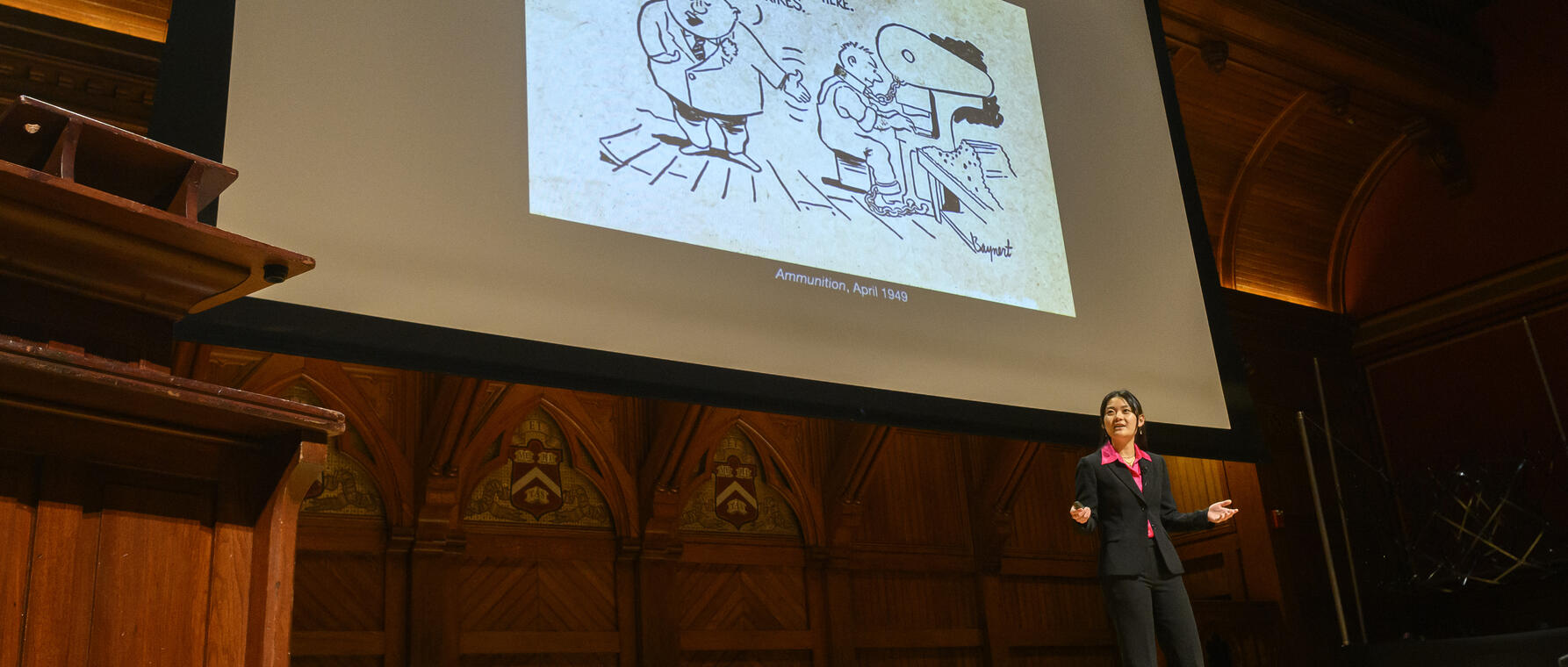Colloquy Podcast: Weary at Work

Research at Risk: Since World War II, universities have worked with the federal government to create an innovation ecosystem that has yielded life-changing progress. Now much of that work may be halted as funding is withdrawn. Find out more about the threats to medical, engineering, and scientific research, as well as how Harvard is fighting to preserve this work—and the University's core values.
As a member of the "people operations" (human resources) staff at Google in the mid-2010s, Harvard Griffin GSAS historian of science Tina Wei was struck by how many perks employees received in the office: door-to-door shuttle service to work, fitness classes, massages, and pantries stocked with snacks, to name just a few. The company even offered a meditation program—with its own branding worked in. In this talk delivered in April 2024 at the annual Harvard Horizons Symposium, Wei argues that while physiological research on bodily fatigue was originally used to support calls for better protection of US laborers’ safety, over time, views of fatigue as a mental issue gave employers an excuse to avoid investing in improvements to working conditions.
This transcript has been edited for clarity and correctness.
In 1917, Max Weber delivered a lecture that would come to form the text of his famous piece, Science as a Vocation. He saw around him a naive optimism that celebrated science as the way to happiness. But he followed Tolstoy in musing that science is meaningless because it gives no answer to the only question important to us. What shall we do, and how shall we live?
A century later, our culture now welcomes and demands that science, technology, and medicine inform the tasks of living well and being happy. As if answering Weber and Tolstoy, research-based well-being has become aspirational, ostentatious, and imperative. Such practices pervade workplaces like Silicon Valley offices of recent decades, where the care and monitoring of workers meld to create a new vision of the happy, modern employee. A keen, historically minded observer may ask what developments of the last century made such shifts possible.
Upon graduating from college, I got a job in Google's department for people operations to explore these curiosities. But all that I had read about Silicon Valley offices could not prepare me for my experience within them––Wi-Fi-equipped shuttles from home, massage parlors, nap pods, fitness classes, food always within 200 feet, and so many meditation programs, all free, of course. Silicon Valley in those days was the mecca of this brand of corporate wellness. But its influence is now commonplace and even facile. To the average American office worker, modern wellness can feel exhausting.
As a PhD candidate in the history of science at Harvard, I've conducted research at two dozen archives across the country to investigate. How did we get here? To trace the roots of modern wellness, I had to track its opposite––what some Americans 100 years ago called industrial fatigue. It was the time when legislators, industrialists, reformers, and indeed the entire country were concerned with the labor problem. By this, they meant the ongoing national violent conflict over the treatment, working conditions, and compensation of industrial workers.
The economic, social, and health consequences of this conflict were legion. And so scientists, engineers, and doctors rushed in to study it and pitch their solutions. But the researchers disagreed over what were the fundamental constituents of fatigue. Their approach is clustered into three camps focusing on physiology, time and motion, and mind.
The physiological research program was often allied with progressive reformers and labor unions. The insights of this research have been enshrined in groundbreaking but still deficient legislation to protect workers’ health and safety. Around the same time, members of the scientific management community who pushed time studies for efficiency used the camera to document human motion to eliminate fatigue. The legacy of this research was modern ergonomics. If you've ever had surgery, used a foot pedal trash can, bought a fancy office chair, or felt like your life was run by the clock, you've been a beneficiary or a victim of these innovations.
But then a group of researchers, first at Harvard Medical School and then at Harvard Business School, proposed a different solution. Overturning decades of research in the physiology of fatigue and even railing against work and time and motion studies, these researchers argued that the labor problem was in the mind. They claimed that the answer to the labor movement was not redress of material conditions, not shorter hours, not higher wages, not fewer fatalities. Workers were actually paid very well, they said.
As unions organized around the debilitating effects of industrial accidents and poisoning, these researchers questioned whether there were any real physical causes that prevented people from working. They argued instead that people who felt aggrieved, discontented, or attracted to radical politics at work showed signs of psychopathy and insanity. The good news was that this mental illness could be treated, and they would show the business world how.
What set apart this final group of researchers was not necessarily their exemplary ideas but that they had the generous patronage of John D. Rockefeller Jr. Their legacy was proselytizing their new perspective, which they first called human relations and later organizational behavior. They argued that for decades, management had failed to ask workers the most important questions about work, which were: do you feel satisfied and fulfilled in your job, do you feel that you belong at work, and above all, do you know that you're beloved by your boss, as they shared with the world the thing about managing human workers, which was different from operating machines, is that humans had these things called minds. Learn to harness that and you can truly make labor work for you.
My dissertation and book in progress chronicles how these three groups of researchers championed their new approaches, negotiated with their wealthy donors, sought the cooperation of the workers they studied, and participated in movements for eugenics and fascism. The views that went out during this historical contest now govern all of our experiences with work. In closing, I just wanted to ask, are you well?
Get the Latest Updates
Join Our Newsletter
Subscribe to Colloquy Podcast
Simplecast




